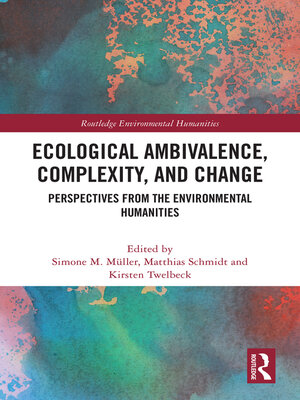Ecological Ambivalence, Complexity, and Change
ebook ∣ Perspectives from the Environmental Humanities · Routledge Environmental Humanities
By Simone M. Müller

Sign up to save your library
With an OverDrive account, you can save your favorite libraries for at-a-glance information about availability. Find out more about OverDrive accounts.
Find this title in Libby, the library reading app by OverDrive.



Search for a digital library with this title
Title found at these libraries:
| Library Name | Distance |
|---|---|
| Loading... |
This book provides a systematic, interdisciplinary analysis of the conflicts, issues, and tensions associated with today's ecological transformation processes from an Environmental Humanities perspective. It explores the notion of ecological ambivalence, where conflicting reactions, beliefs, or feelings toward public policies or private practices for "saving planet Earth" threaten to produce a stalemate.
Under the umbrella of the Environmental Humanities, the book brings together scholars from fields such as environmental history, ecological economics, human geography, and ecocriticism. Contributions investigate the dissonances, or ambivalences, wound up with processes of environmental transformation both conceptually and empirically. Case studies range from wind farms in India to green mineral mines in Mexico, and from chemical contamination in Denmark to Rocky Mountain Arsenal in Denver, USA. Additionally, with a focus on creative environmental communication—as in Philippe Squarzoni's graphic novel Climate Changed or G'Ebinyo Ogbowei's poetry—contributions also present possible pathways for overcoming ambivalences, managing them creatively, or critiquing the concept as whole. The volume highlights how the humanities, the arts, and the social sciences can work together to help humankind develop and cultivate the skills to overcome paralysis and engage in practical action, and in doing so, puts forth ambivalence as an approach for being in today's world.
This book will be of interest to researchers, academics, and students from the Environmental Humanities, the social sciences, the humanities, and the environmental sciences. It will also be useful for decisionmakers, think tanks, NGOs, and activists.







